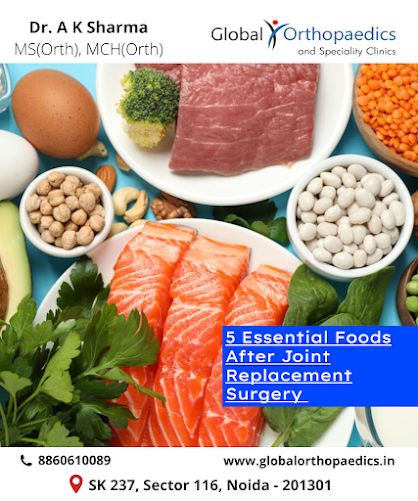Joint replacement surgery, like knee or hip replacement, is a life-changing procedure for individuals in Noida seeking to regain mobility and alleviate pain. While the surgery itself is a crucial step, the recovery journey holds immense importance. Proper nutrition plays a vital role in this process, aiding in healing, strengthening tissues, and managing inflammation. So, what should you be putting on your plate after joint replacement surgery performed by the best knee replacement surgeon in Noida? Here are 5 essential foods to prioritize:
1. Protein Powerhouses:
Protein is the building block for tissue repair and muscle growth. During recovery, your body needs readily available protein to rebuild the muscles and connective tissues around the replaced joint. Here are some excellent choices:
Lean Meats: Opt for lean cuts of chicken, turkey,
fish, and occasionally red meat (trimmed of excess fat). These provide
high-quality protein and essential amino acids.
Eggs: A complete protein source packed with essential
nutrients, eggs are a versatile and delicious addition to your diet.
Beans and Legumes: Lentils, chickpeas, and black
beans are excellent plant-based protein sources rich in fiber, vitamins, and
minerals.
Dairy Products: Yogurt, cheese, and low-fat milk
offer protein, calcium (crucial for bone health), and vitamin D, aiding in bone
density and muscle recovery.
2. Bone-Building Calcium Sources:
Calcium is essential for maintaining strong bones, and after joint replacement surgery, ensuring adequate calcium intake is crucial. Here are some top calcium-rich options:
Dairy Products: As mentioned earlier, dairy products
like cheese, yogurt, and fortified milk are excellent sources of readily
absorbable calcium.
Leafy Green Vegetables: Kale, spinach, and collard
greens are packed with calcium and other vital nutrients like vitamin K,
contributing to bone health.
Tofu and Fortified Plant-Based Milks: These are
excellent alternatives for those who are lactose intolerant or follow a
plant-based diet. Look for varieties fortified with calcium and vitamin D.
Sardines and Salmon: Fatty fish like sardines and
salmon are not only rich in protein but also contain vitamin D, which helps
your body absorb calcium effectively.
3. Vitamin C for Collagen Production:
Vitamin C plays a vital role in collagen production, a key component of connective tissues and cartilage. Here are some delicious ways to boost your vitamin C intake:
Citrus Fruits: Oranges, grapefruits, and grapefruits
are rich sources of vitamin C and add a refreshing element to your meals.
Bell Peppers: Red, yellow, and orange bell peppers
are not only bursting with vitamin C but also offer a good dose of vitamin A,
essential for overall health.
Berries: Strawberries, blueberries, and raspberries
are delicious sources of vitamin C and antioxidants, promoting overall healing.
Broccoli: This versatile vegetable is a powerhouse of
vitamin C, vitamin K, and fiber, benefiting both bone and tissue health.
4. Anti-Inflammatory Power of Fruits and Vegetables:
Inflammation is a natural part of the healing process following surgery. However, consuming anti-inflammatory foods can help manage it effectively. Here are some excellent choices:
Fatty Fish: Salmon, sardines, and mackerel are rich
in omega-3 fatty acids known for their anti-inflammatory properties.
Tomatoes: Containing lycopene, an antioxidant with
anti-inflammatory effects, tomatoes are a delicious addition to your diet.
Berries: Berries, particularly blueberries and
strawberries, are packed with antioxidants that help reduce inflammation.
Dark Leafy Greens: Spinach, kale, and collard greens
contain antioxidants and phytonutrients that aid in managing inflammation.
5. Hydration Hero: Water
Water is essential for every bodily function, and following
joint replacement surgery, staying hydrated is paramount. Proper hydration
helps with nutrient absorption, waste removal, and overall recovery. Aim for
8-10 glasses of water daily, adjusting based on your activity level and
climate.
Remember:
·
Consult Dr. Ashok Kumar Sharma before making
significant changes to your diet after surgery.
·
These are general recommendations, and
individual dietary needs might differ.
·
Pay attention to portion sizes and maintain a
balanced diet for optimal recovery.
Finding the Right Surgeon in Noida:
When seeking a joint replacement surgeon in Noida,
consider factors like:
Experience: Choose a surgeon with extensive
experience performing the specific type of joint replacement surgery you
require.
Qualifications: Verify board certification in
orthopedic surgery and any relevant subspecialties.
Patient Testimonials: Reading online reviews and
testimonials can offer valuable insights.
Visit our clinic - Global Orthopaedics and Speciality
Clinics at SK 237, Sector 116, Noida, Uttar Pradesh 201301 if you are
considering joint replacement surgery.

Comments
Post a Comment